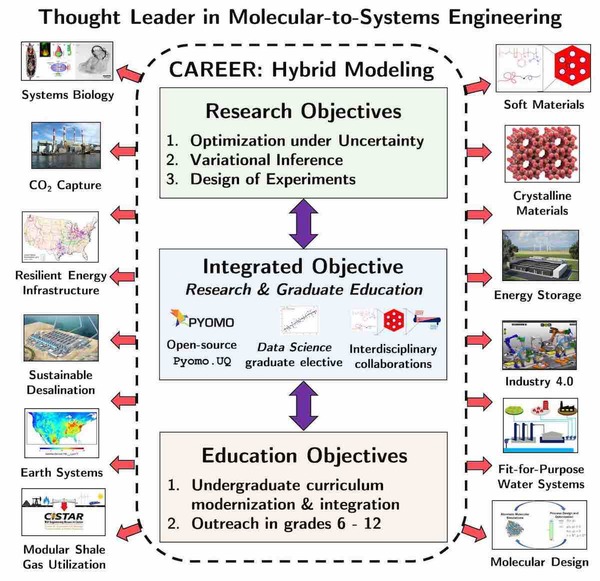
Prof. Dowling's proposal CAREER: Uncertainty Quantification and Optimization with Hybrid Models for Molecular-to-Systems Engineering is selected for funding! Below is the public abstract:
Multiscale modeling combines molecular, material, device, system, and infrastructure scales into holistic approaches to create targeted technologies that meet national and global needs. However, most multiscale frameworks require over-simplification to ensure reasonable computation time, even when using a supercomputer. These over-simplifications introduce uncertainty and can bias analyses and decisions. The investigator seeks to establish new hybrid modeling methodologies to explicitly quantify, propagate, and mitigate uncertainty (i.e., information loss) across vast length and timescales. The investigator predicts that hybrid models will improve safety, enhance performance, reduce environmental impact, and improve efficiency in chemical manufacturing and energy conversion systems through more accurate and predictive multiscale models. Multiscale engineering frameworks enabled by hybrid models can accelerate many domains of science, engineering, and public policy of national importance, including climate change, water scarcity, and advanced manufacturing by enabling more effective top-down and bottom-up integration across interdisciplinary teams of scientists, engineers, and decision-makers. The project enmeshes education and research by leveraging interactive modules and cloud-computing to integrate statistics and computing at all grade levels. In partnership with local educators, the investigator plans to create educational modules aligned with computer science curricula for grades 6 - 12. Educational modules to incorporate statistics and computing across the chemical engineering undergraduate and graduate curricula will also be developed. Whenever possible, research software and educational materials will be distributed online for free to maximize impact.
This CAREER program seeks to establish rigorous mathematical frameworks to quantify the information loss and induced epistemic uncertainty from multiscale model reduction. Hybrid models can overcome this challenge by augmenting physics-based equations with data-driven machine learning constructs (e.g., Gaussian Processes) to quantify effects of missing, unknown, or simplified physics. The investigator will address three fundamental research questions to enable scalable hybrid modeling for molecular-to-systems engineering: (1) How to efficiently embed hybrid models in optimization problems, thereby extending optimization under uncertainty paradigms to consider epistemic (i.e., model-form) uncertainty?; (2) How to leverage approximate variational inference techniques to accelerate hybrid model training by orders of magnitude?; and (3) How to compute optimal design of experiments (DOE) for hybrid models? This approach will promote convergence of statistics, machine learning, computational optimization, and chemical engineering. Sparse grids and compressed sensing will be examined to enable tractable optimization under uncertainty including new frameworks for reaction engineering under epistemic uncertainty. Likewise, 10x to 100x faster hybrid model training could enable online control. Generalizing model-based DOE and Bayesian optimization formalism could enable DOE for hybrid models, offering new capabilities to maximize resource-constrained experiments in collaborative teams. Cloud-hosted Jupyter notebooks are proposed to integrate computing and statistics across curricula from graduate to middle school levels, helping to ensure the future U.S. workforce is well-equipped to leverage hybrid models and machine learning advances for decades to come.